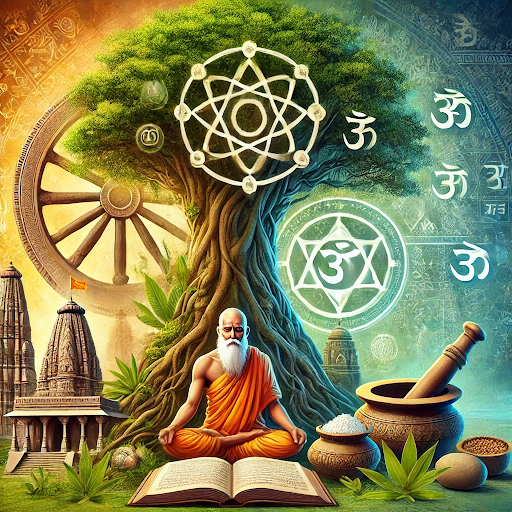Definition & Scope; Relevance of this Knowledge
Definition: The Knowledge of India refers to the vast repository of wisdom,
scientific advancements, philosophical thought, spiritual practices, art forms,
governance systems, and cultural heritage developed over millennia. It
encompasses disciplines like Ayurveda, yoga, astronomy, mathematics,
literature, architecture, and ethical philosophy.
Scope:
- Multidisciplinary: It
spans fields as diverse as health sciences, education, governance,
agriculture, linguistics, and arts.
- Timelessness:
Ancient Indian knowledge remains relevant due to its universal values,
sustainability principles, and holistic approaches to life.
- Global Influence:
Ideas originating in India, such as zero, yoga, and meditation, have
influenced global science, technology, and culture.
- Sustainability: Many
practices rooted in Indian traditions align with contemporary ecological
and sustainable development goals.
Relevance:
- Holistic Development: It
offers frameworks for physical, mental, and spiritual well-being.
- Ethical Foundations: It
instills values like harmony, inclusivity, and respect for diversity.
- Modern Applications:
Indian knowledge systems provide solutions for contemporary challenges in
health, technology, and social cohesion.
- National Identity:
Reviving and promoting this knowledge strengthens cultural identity and
pride.
B. Need to Revisit Our Ancient Knowledge,
Traditions, and Culture
- Rediscovery of Roots:
Understanding and embracing ancient traditions reconnects individuals to
their cultural and spiritual origins, fostering a sense of identity and
belonging.
- Timeless Wisdom:
Indian knowledge systems, such as Ayurveda, yoga, and Vedic mathematics,
offer insights that remain applicable in modern contexts, from healthcare
to education.
- Cultural Heritage:
Revitalizing traditional arts, languages, and crafts preserves cultural
diversity and supports sustainable livelihoods for artisans.
- Global Relevance: Many
ancient Indian ideas resonate with global movements, such as mindfulness,
organic farming, and renewable energy.
- Education Reform:
Incorporating Indian knowledge into modern curricula aligns with the goals
of NEP 2020, promoting a balanced and inclusive education system.
- Addressing Misconceptions:
Revisiting and accurately documenting ancient traditions helps dispel
myths and misunderstandings, offering a genuine representation of India’s
contributions to the world.
- Cultural Resilience: As
globalization challenges traditional identities, reviving and integrating
ancient knowledge strengthens societal resilience and adaptability.
By revisiting and integrating the Knowledge of
India into contemporary life, we honor our heritage while enriching global
discourse on sustainable and inclusive development.




No comments:
Post a Comment